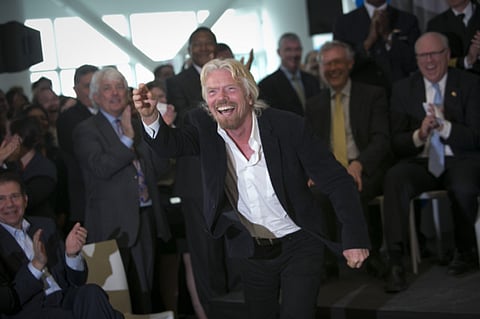Richard Branson and Mike Oldfield reminisce
Branson and Oldfield recall how an offering by a closet genius kick-started Virgin

Richard Branson, Virgin founder
After setting up the first Virgin record shop in London, we scraped together some money and bought a rundown country house and converted its squash court into a recording studio called the Manor. One day, an engineer from the Manor rang me and said he’d heard this incredible instrumental demo tape by a teenager called Mike Oldfield. It was some of the most beautiful music I’d ever heard. Mike’s mother was an alcoholic, and when he was 14 or 15, he shut himself in the loft and composed. He played every instrument himself. His expression came out in the music. He was an absolute genius.
By the time I heard the tape, he was the second reserve guitarist in the musical Hair, and was frustrated and desperate to get an album out. I took the tape to record companies: Mercury said they’d release it if Mike added vocals, which he didn’t want at all. Eventually, we decided to just set up our own record company. We borrowed a contract from the only artist we knew, Sandy Denny from Fairport Convention, scrubbed her name off and wrote in “Mike Oldfield”. Then we sent Mike to live at the Manor for a week to record it properly and Tubular Bells became the first release on Virgin.
John Peel announced that he’d come across something extraordinary and played the entire album on his radio show. Mike agreed to do one concert at London’s Queen Elizabeth Hall, and we persuaded Mick Taylor from the Rolling Stones and Steve Winwood to perform with him. But on the way, he panicked and suddenly said he couldn’t go on. I had an old tumbledown Bentley and pulled over and said: “If I gave you the keys to this Bentley, would you change your mind?”
He did. The concert was an astounding success – standing ovations – but Mike immediately went back into his shell. He wouldn’t do interviews or tour. Fortunately the music spoke for itself. Tubular Bells and Pink Floyd’s Dark Side of the Moon vied for top chart positions and Virgin became the world’s biggest independent label, signing the Sex Pistols and the Rolling Stones. We’ve named one of our Virgin aircraft Tubular Belle and we are going into space this year. I doubt any of that would have happened without Tubular Bells. I’ve listened to it so much, my wife won’t let me play it any more.
Mike Oldfield, composer
I suppose I was advanced for my age. I started playing acoustic guitar in folk clubs at about nine years old, making up instrumentals. I had the kind of brain that remembers and absorbs things I could remember my own birth, which resulted in panic attacks. All those years, these ideas were building. I listened to everything from hard rock to what’s now called world music and didn’t see why they couldn’t exist in the same piece of music.
Tubular Bells had been in my head for ages. I made the original demo in a flat in Tottenham on an old tape machine lent to me by [Soft Machine’s] Kevin Ayers. I played organ, bass, electric guitar and two little percussion toys. But later, when I was recording some session guitar for Kevin at Abbey Road, there were all these wonderful instruments around: harpsichords, timpanis, tubular bells so I would experiment on them before every-one else arrived. That’s how I came to play 20 instruments on Tubular Bells.
One was the Glorfindel, the precursor to the modern synthesiser, a wooden box with knobs on, named after the Lord of the Rings character. I wrote most of it on the honky-tonk piano that had been my grandmother’s but came to our family home in Essex when she died. Before the war, she’d been a pub pianist, so the “nasal choir” bit with people humming round a piano was a homage.
The Bonzo Dog Doo-Dah Band were due in the Manor the day after us, and they arrived as we were up all night mixing. On the off chance, I asked Viv Stanshall if he’d come into the studio and introduce all the instruments on the record, so he became “Master of ceremonies”. When record companies rejected the album because it didn’t have any lyrics or drums, I was a bit annoyed to find Richard and an engineer remixing it. So I went back into the studio, drank half a bottle of whisky and added caveman noises. It was my form of protest: “Stop fiddling with my music!”
The iconic cover featured a chromium-plated bent tubular bell set up in a photo studio. Later when I asked what happened to it they said: “We threw it out, mate.”
I didn’t feel I could reproduce the album on a stage. Richard gave me his Bentley so I would do it, but I later discovered the car cost more to repair than it was worth. Having been seen as some village idiot, I was suddenly everyone’s greatest hero. So I went to live in the Welsh hillsides, surrounded by sheep.
But I’d always had an inkling that if someone gave me the chance I could make something really special. When I met Richard, I’d just discovered that the Soviet Union had state-employed musicians. If it wasn’t for him, I could be playing the balalaikain Red Square now. If someone had told me in 1970 that the little melody I was playing in my flat in Tottenham would be the trumpet fanfare that opened the 2012 Olympic Games, I’d have told them they were out of their mind.
Tubular Bells for Two, a live show celebrating the album’s 40th anniversary, is touring from tomorrow.



